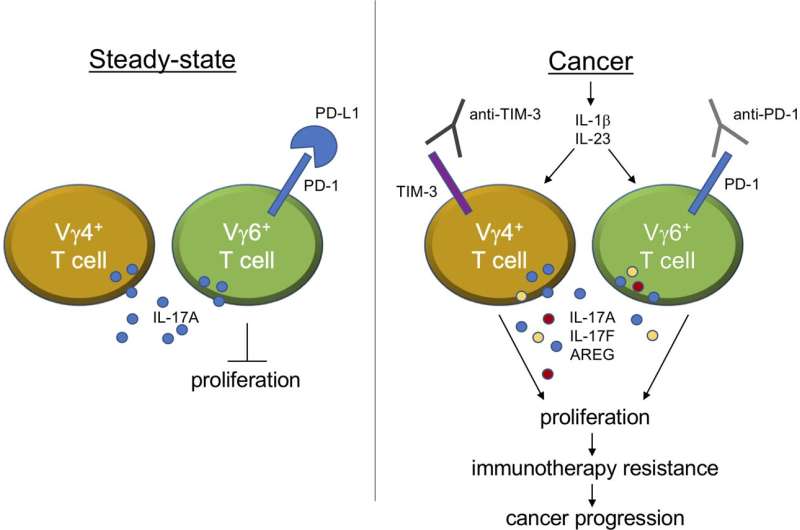Graphical abstract. Credit: Journal of Experimental Medicine (2022). DOI: 10.1084/jem.20211431
Breast cancer immunotherapy could be more effective if an immune cell that prevents it from working is targeted at the same time, according to new research from the University of Glasgow.
This discovery, published in the Journal of Experimental Medicine, may be the first step in uncovering new ways to stop the disease spreading to the lung. When breast cancer spreads to other parts of the body it's known as secondary (metastatic) breast cancer which can't be cured.
Researchers at the University of Glasgow, led by Dr. Seth Coffelt, built on previous findings to understand how an immune cell called a gamma delta T cell can weaken the impact of immunotherapy.
Immunotherapy is a cancer treatment which turns on the immune system to fight the disease. It works by helping the immune system recognize and attack cancer cells.
The team found that removing gamma delta T cells stopped breast cancer spreading to the lung in mice treated with a type of immunotherapy called checkpoint inhibitors.
They also uncovered a sequence of events that reduced the effectiveness of this immunotherapy treatment and a potential way to counteract it.
Breast cancer cells can trick nearby immune cells to release molecules which trigger gamma delta T cells to multiply and make their own molecule called IL-17A. This molecule is already known to benefit cancer cells and can make the immunotherapy less effective.
When mice with and without gamma delta T cells were treated with immunotherapy, the drugs successfully prevented breast cancer from spreading to the lung in those where the cells were absent.
This suggests that targeting gamma delta T cells and the molecule IL-17A has the potential to help immunotherapy drugs like pembrolizumab (Keytruda) be more effective at stopping secondary (metastatic) breast cancer in some patients.
Dr. Seth Coffelt, Senior Research Fellow at the University of Glasgow, said, "For the first time we've managed to pinpoint exactly how gamma delta T cells can prevent immunotherapy from working. While this is early-stage research and we still have a lot of work to do to establish whether these cells work in the same way in women, it's exciting to see there may potentially be a way to supercharge the effectiveness of immunotherapy treatments and ensure that more people can benefit from them."
Next, researchers plan to investigate which triple negative tumors donated by patients make high levels of IL-17A and to continue research in mice to explore potential combinations of immunotherapy and anti-IL-17A drugs. These drugs already exist for autoimmune conditions like psoriasis, which could speed up the next steps of this research.
Dr. Simon Vincent, director of research, support and influencing at Breast Cancer Now, said, "It's vital we develop smarter, more effective treatments for people with breast cancer so these early findings which show how we may be able to boost the power of existing immunotherapy drugs are really encouraging.
"We know just how devastating a diagnosis of secondary (metastatic) breast cancer can be so to be able to help immunotherapy be even more effective at preventing the disease spreading may save lives in the future."
More information: Sarah Edwards et al, PD-1 and TIM-3 differentially regulate subsets of mouse IL-17A-producing gamma delta T cells, Journal of Experimental Medicine (2022). DOI: 10.1084/jem.20211431
Journal information: Journal of Experimental Medicine
Provided by University of Glasgow
























